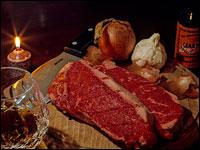Transcript
BOB GARFIELD:
When The Philadelphia Inquirer's notorious food critic, Craig LaBan, trashed the presumed strip steak at the restaurant Chops, owner Alex Plotkin filed suit. This led to depositions, which were to be recorded on video, which presented a problem for LaBan.
Determined to remain unrecognizable to other local restaurateurs, he wore a disguise to the proceedings. The judge would have none of it, ordering LaBan to remove the getup.
But the camera-shy critic's problems were just beginning. The story of a business owner claiming libel over defamed meat has captured the city's imagination and that of Philadelphia Magazine¸ which not only chronicled the dispute but published a photograph of LaBan. Why expose a man who needs anonymity to ply his trade? Philadelphia Magazine editor Larry Platt is here to tell us. Larry, welcome to On the Media.
LARRY PLATT:
Thanks for having me.
BOB GARFIELD:
All right. Let me talk to you about the particulars of the case itself. It began in a capsule review underneath a major review of another restaurant in which LaBan dismissed a steak he had at lunchtime at the restaurant in question as a "miserably tough and fatty strip steak." And he's being sued for libel because [LAUGHS] it was, in fact, not a strip steak but another cut of meat. And the strip steak is the signature dish at this restaurant, and the owner, a fellow named Alex Plotkin, believes that the business has been materially damaged.
LARRY PLATT:
I think that is a fair description. Absurdly enough, yes.
BOB GARFIELD:
What do you make of the libel case? I mean, can you libel a cut of meat?
LARRY PLATT:
Obviously, opinion is protected. The restaurateur in this case didn't sue because he didn't like an opinion, he says. He sued because the facts were wrong and the reviewer, Craig LaBan, didn't do his due diligence to check the facts. And so that -
BOB GARFIELD:
Which would possibly constitute a malicious disregard of the facts, which takes you out of the realm of opinion and into news gathering, where even a critic, I suppose, is vulnerable to a libel case.
LARRY PLATT:
Exactly.
BOB GARFIELD:
Should the restaurateur prevail here in a case of [LAUGHS] aggravated meat misidentification, how will you feel as a journalist who has to beware of libel in his own publication?
LARRY PLATT:
I actually think the libel laws are good in this country, and they keep journalists honest. I believe, and I, throughout my career, have learned how much power we have, and I think they are always a good check on the power of the pen.
If it comes down to an issue of news gathering, anything that makes reporters more careful I think is for the good.
BOB GARFIELD:
Craig LaBan makes a living as a food critic. He has to go into restaurants and face the people whose work he is reviewing, so anonymity is very important to him. Can you tell me what journalistic purpose is served by printing his photograph?
LARRY PLATT:
Sure. He's not really anonymous to begin with, by his own admission. Most of the restaurateurs in Philadelphia have posted in their kitchens photos of him. Media insiders, like myself, know what he looks like. The only group that doesn't know what he looks like are the readers and the diners, and we have always extended the courtesy to Craig, as to other reviewers, of maintaining anonymity.
But something changed, and that was he became part of a new story, and we show the protagonists in our news stories.
BOB GARFIELD:
Are you sure, by the way, that his photo is in the kitchen or behind the maitre d' podium at every restaurant of any consequence in the Philadelphia area?
LARRY PLATT:
Yes, and so is he, by the way. I had a conversation with him before we did this in which he said, yeah, all the major restaurateurs know what I look like. Some of the mom-and-pops don't, but it's easy to find out. I made three phone calls and [LAUGHS] was inundated with photos of him from kitchens around the city.
This whole question of Craig LaBan's anonymity is tied up with a lot of self-importance. I mean, he is not Valerie Plame. This is not an issue [BOB LAUGHS] of national security. He's a guy who eats meals and writes about them. Most reviewers in the United States don't do so anonymously. Craig's predecessor at The Inquirer had her picture in the paper for 20-some-odd years.
BOB GARFIELD:
Now, there's also the aspect of theatricality behind this, because Craig LaBan has appeared in public in various disguises [LAUGHS] and has been photographed with his face obscured by, I don't know, a bunch of baguettes and so forth. So part of his shtick is that, at least to the public at large, he remains a faceless critic.
LARRY PLATT:
We quote Zack Stalberg, the former editor of The Philadelphia Daily News, as saying that basically the issue of Craig LaBan's anonymity has become something of a gimmick. I'll give you an example. Selling a book, a collection of his reviews, he had a public reading and showed up in elaborate disguise. For the deposition in this lawsuit, he showed up wearing a wig and sunglasses and speaking in a falsetto. The judge apparently made him [BOTH LAUGH] lose the wig and speak in his normal voice.
And, like I said, we’re not talking about [LAUGHS] the state of the nation here, and we just felt why should we be complicit in other media's publicity stunts?
BOB GARFIELD:
All right. Larry, I appreciate your joining us.
LARRY PLATT:
Oh, thank you very much, Bob.
BOB GARFIELD:
Larry Platt is editor-in-chief of Philadelphia Magazine.

